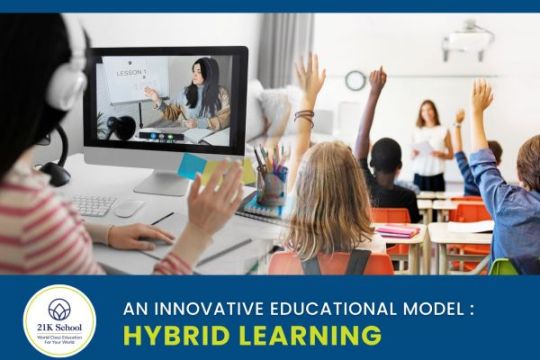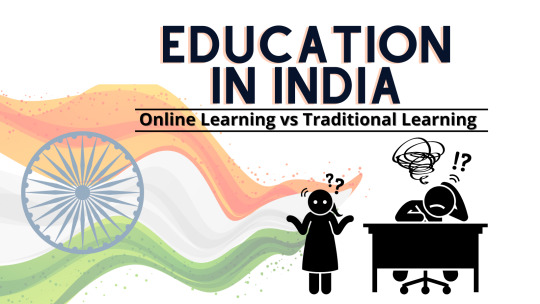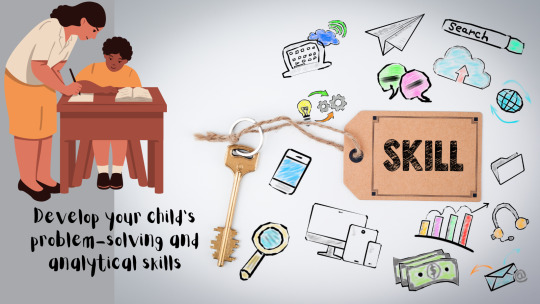#virtual schooling
Text
The 21K School Difference—Why Our Virtual Schooling is Superior

When it comes to virtual schools, 21K School is head and shoulders above the rest. The slogan, “Let’s do Education Right,” says it all. 21K School started in June 2020 and is the first to bring virtual schooling to India as a complete school. Let’s look at this pragmatically and form a complete opinion of 21K School.
21K School—Roots
The school was started with a vision to bring education that is affordable, is of good quality, and makes a real difference in students’ lives. The underlying principle is to provide meaningful and joyful education to every student.
What Does 21K School Offer?
Well, you could ask, what does 21K School offer that other virtual schools don’t? However, the question should be, why is 21K School superior to other schools? Why is it the right choice for your child?
Options of Curricula
21K School is a formally recognized educational institution that provides various curricula for students to choose from.
Indian Curriculum
Strict adherence to the National Curriculum Framework (NCF) of India ensures that your child gets the best out of the Indian curriculum. This framework is used up to middle school. Grades ten and twelve certificates are issued by NIOS (National Institute of Open Schooling). The certificates are equivalent to any CBSE or ICSE certificates.
British Curriculum
21K School is also affiliated with and is an approved center of Pearson Edexcel. Furthermore, partnerships with NISAI also allow students to opt for Cambridge International Certifications.
American Curriculum
21K School’s partnership with Stride also means that it allows children to choose an American curriculum. 21K School’s partner is accredited by Cognia and the Middle States Association of Colleges and Schools.
Flexibility
21K School is ideal for students with unique interests and who want to delve into more detail of learning. The school also is a boon for parents who prefer to home school their children but allows a structured approach to be followed.
Even if you don’t have access to good schools in your locale, 21K School provides the quality of virtual learning to ensure your child becomes a holistic learner.
Traditional schools are often limiting if your child has talents that you want to nurture. With 21K School, you can allow your child to become a prodigy in their chosen interest while ensuring they get a good educational foundation.
Children with various disabilities or those prone to illness will find that 21K School allows them to become a part of a wonderful community. They are given the meticulous attention they need and the space they need to grow as individuals.
21K School also offers the choice of classes in the morning or afternoon, allowing parents to be a part of their learning. Students can attend both live and recorded classes, further giving them the flexibility they need to learn at their own pace.
Educators
Owing to the fact that 21K School is virtual, it is able to pick and choose the best educators from all over India and the world and deliver their classes directly to your child. This ensures that your child gets nothing but the best quality of education.
Virtual schooling through 21K School allows all students to learn on a level playing field, with educators trained to ensure focused attention is given to each child, and a child’s learning needs are prioritized over merely completing portions.
Beyond Books
21K School knows the importance of physical education and mental well-being. Students can choose to learn yoga, participate in meditation, and various other extra-curricular activities. With focused and thus shortened learning hours, children are allowed to be children. They can focus on their chosen sports and interests and become great at what they love.
Beyond the Curriculum
Students get everything they need from 21K School’s various curricula. The school also ensures that students have access to learning Foreign Languages, Advanced Mathematics, Creativity, Photography, Multimedia, Poetry, Drama & Theatre, Public Speaking, Robotics, and many other options.
Access
It doesn’t matter where you are. 21K School can be accessed as long as you have a smartphone or smart mobile device and a working internet connection. 21K School ensures that students who don’t have access to Wi-Fi are also able to access quality education on telecom-provided data networks.
Readying Your Child for the Future
21K School isn’t merely a remedial option. It provides your child with everything they would get from a traditional school and more but at a much higher quality. The approach is to understand what the future holds and prepare your children for a future where they can embrace their abilities and become successful.
Exposure
Parents have found that 21K School has been the right choice for them. This is why there are over 3500 students enrolled from all over the world. In addition to putting your mind at ease about the quality of education, this also means that your child will be culturally adept and understand much more of the world.
Focus
21K School also ensures that students get what they need from their educators. This means that lower classes only allow ten students per class, and higher classes go up to fifteen students per class.
Involvement
21K School encourages parents to be a part of their child’s learning experience. This ensures that parents know exactly what their child is learning and, more importantly, become a part of their entire educational experience.
Technology
Not only does 21K School use the world’s best-proven education systems, but it also ensures that the latest tech is used to guarantee the best learning experience. With virtual reality labs and immersive learning experiences, your child is able to experience as they learn.
Parents don’t get a chance to redo their child’s education. That is why 21K School knows that it is important to do education right.
4 notes
·
View notes
Text
https://www.k12onlineschools.com/cambridge-igcse/
Discover a new era of education with K12 Online School's virtual schooling program in India. Join us for interactive learning and academic excellence.
0 notes
Text
Strategies for Effective Hybrid Learning
Are you someone who enjoys the convenience of learning from the comfort of your own home, but also thrives in a classroom setting? If so, then hybrid learning might just be the perfect fit for you! This innovative approach to education combines the best of both worlds by incorporating both online and in-person learning experiences.

21K School is driving forward the vital movement of HyTech Schooling, an innovative educational model that combines the benefits of traditional in-person schooling with the flexibility and high-tech learning experience of online education.
The school recognizes the importance of hybrid learning and is committed to creating a brighter educational future through the HyTech model. In addition to the academic curriculum, HyTech Schooling offered by 21K School also includes SEL programming and sports activities year-round, which is expected to foster greater student development and provide cutting-edge social educational opportunities.
The model will be available in select cities from Academic Year 2023 and aims to be accessible to all parents across India and worldwide by Academic Year 2025. Parents are encouraged to join 21K School's movement and provide their children with the opportunity to thrive in the brave new world.
So how can you make the most of this innovative approach to education? Here are some strategies for effective hybrid learning:
Set clear goals and expectations:
Before you start your hybrid learning journey, take the time to set clear goals and expectations for yourself. This will help you stay focused and motivated throughout the learning process.
Stay organized:
Hybrid learning can sometimes feel overwhelming, especially if you're juggling multiple classes or assignments. Stay organized by creating a schedule and setting reminders for important deadlines.
Stay connected:
Even though you may not be physically in the classroom all the time, it's important to stay connected with your teachers and peers. Participate in online discussions and attend in-person sessions whenever possible.
Take advantage of technology:
Hybrid learning relies heavily on technology, so make sure you have access to the right tools and resources. This could include a reliable internet connection, a laptop or tablet, and educational software or apps.
Embrace flexibility:
One of the biggest benefits of hybrid learning is the flexibility it offers. Don't be afraid to adapt your learning approach as needed and take advantage of the many opportunities that hybrid learning provides.
SUMMING UP:
In conclusion, hybrid learning is an innovative and flexible approach to education that combines the best of both worlds - online and in-person learning. With the launch of 21K School's Hytech model, students can now enjoy the benefits of hybrid learning in physical learning centers starting from Bangalore.
So why not take advantage of this exciting opportunity and enroll in a hybrid learning program today? With the right mindset and the right resources, you can achieve academic success and take your learning to the next level.
0 notes
Text
Indian Education System | Online Learning vs Traditional Learning

The Indian education system transformed completely in the wake of the recent global health crisis. The restriction on movement put students into their homes and this gave birth to a new way of education, i.e. online classes.
Since then, online education in India has seen a boom in terms of the number of students attending each class and the overall participants. According to the market research firm RedSeer, the online education market in India will grow about 50% to reach $5 billion by 2025.
This sudden growth of online education brings up a very apparent question, why must the Indian education system must change? Well, read on to understand.
Why Must the Indian Education System Change?
You can find the early signs of Indian education through the Vedas and in different books by travellers of those times. A thing that was very evident is that it was a fairly advanced education system and quite ahead of its time.
However, the arrival of British and other foreign entities had a profound effect on this country’s education system. The introduction of printed books and the exposure to global literature, history and other subjects transformed this sector.
Even though it was great, to begin with, the education system in India has not witnessed any major changes after that. But, the introduction of online education and modern technologies paved a new way for this country’s education system.
Now, both the traditional and online learning methodologies have their own positives and negatives, which have been discussed below.
Traditional Learning
Pros:
The human connection
The value of the human connection cannot be undermined as a traditional medium allows students to see the teacher as well as their classmates personally and thus connect with them physically as we are all humans and seek company from time to time.
Interpersonal and social skills
Students in a traditional learning setup get to interact and communicate with their classmates and peers, which fosters or supports the development of healthy social skills, something that holds them in good stead in the future.
Structure and discipline
The traditional medium of learning follows a particular routine, which teaches students the value of discipline and inculcates the same in them as they are made to follow it quite strictly. They learn the art of managing time while juggling their various subjects’ lessons, assignments, etc.
Cons:
Expensive
The cost of traditional learning, such as the price of uniforms, school or institution fees, and transportation charges, prove to be a heavy financial burden for parents.
Time spent in commuting
For those students who live far away from their schools, such as in the suburban districts, commuting every day becomes a rather tough affair, as well as expensive as they have to use a variety of transport modes to reach their institutions.
According to a report published in Hindustan Times, about 60% of India’s urban and 64% of rural school students, on average, walk to school, while 12.4% of students use public transport.
Online Learning
Pros:
Can be remotely accessed
An online lesson can be accessed from anywhere in the country if you have an internet connection. A student need not be physically present in the school or institution or in the city it is located to access it. With more than 600 million active internet users in 2020 and an expectation of touching 900 million by 2025, the blessings of the internet have reached almost every corner of this country.
Flexibility of learning
Not every student is the same and each student has his/her own speed and pace of learning. In a traditional classroom, it is not possible to absorb all the lessons simultaneously, which is possible in the online medium. A student who has missed a lesson can also review the lesson by accessing the recorded lesson, which is a great boon, as there might be many reasons why he/she was unable to attend a particular class.
An abundance of mediums for learning
If a student cannot understand a particular question or topic from his/her institution, then he/she can access various websites which can provide the said answer and thus help him/her munificently.
Cons:
Distractions and health issues
Owing to the internet connection, if a student does not find a particular lesson appealing, then he/she can easily switch to other websites which may not be linked to the actual subject to while away the hours.
The long time spent in front of the screen coupled with no physical activity also leads to physical and mental health issues.
Loss of the human factor
Students cannot interact with their fellow classmates and peers physically, which increases their feeling of isolation, as they cannot reach out either to mentors for doubts or their friends to relieve their stress.
Lack of practical courses
Students enrolled in various science or art-based courses find it difficult to locate additional study programmes or sources where they can avail practical material to compensate for the lack of the physical infrastructure.
A comparative study like this presents a broader picture of the online learning vs traditional learning debate. The need of the hour is that the Indian education system must change as an emphasis on either medium or method will neither serve the institutions nor their students. There is no denying the fact that the emergence of online education has affected the offline system, but if you look at the well-reputed educational institutions, students still aspire to be there.
To sum up, instead of wondering whether online education in India is the future or not, it is important to focus on its quality. Moreover, it is important to consider if the courses taught in schools and colleges are increasing the employability and skills of students or not. The India Skills Report of 2021 shows that only about 46% of India’s youth is capable of getting employment. Therefore, taking this alarming stat in the stride, India’s education system must change for the better, whether online or offline.
#homeschooling#homeschooling in india#online homeschooling#online schools#online schooling#virtual schooling#education
0 notes
Text
Impact of Economic Downturn on Schools

An economic downturn is the result of a backlash from the economy itself over a specific period of time. It might be noticed within a country or can even spread to a global scale. The key identification factors for such a state are generally high rates of unemployment, declining rates of investment and shares, and an overall decrease in the gross domestic product (GDP).
A recession of such sort had held the entire world in strict claws when a deadly disease of Covid-19 made its entry in 2020. Strict norms of social distancing had made the entire world house arrested, including schools. This article will shed light on how to survive the recession and how online learning stands as the future of education.
Response and Recovery Post-recession
The economic aftershock of the Covid-19 pandemic has rendered a deadly backlash to all sectors, let alone the education sector. Since schools are essential to every kid’s education, closing their doors is not a solution.
Instead, a shift toward the online domain of education is seemingly feasible. This would ensure protection and psychological support and would not be a barrier to the social and interpersonal development of the child. This brings up the necessity of online schooling.
Tips to Address Recession in Schools
A recession always calls for shortfalls in the budget. But, this is not the end of the world. The economy can thrive and come back stronger. Here are a few ways to help to tackle moments of crisis:
An emergency fund should always be kept handy to meet unprecedented losses.
Living within your means is an important criterion. Expenditure without planning brings you to be in debt.
Investing for the long term is necessary. It is more resistant to a recession.
A culmination of all of these factors helps schools handle the situation in a better manner and save them from unprecedented losses. While we talk about the economic downturn, it is important to discuss the advantages of online schools too.
Why Should You Opt for Online Schools?
Here are some reasons why online schools can be a great solution –
Ensuring well-being and psychological needs: Since school closures have questioned the emotional well-being of students, online schools have come to the rescue. Teachers are able to look into the matter once they start communicating with students virtually.
Students are occupied: With the regular regime of online classes according to school routine, students have less time to idle away. They develop a sense of responsibility to sit and attend classes.
Students receive support to catch up on lost learning: With the curriculum being received in the comfort of homes, students do not face the risk of losing the pace of learning. They always remain on track with respect to education.
Identification of learner’s needs: Online classes are generally student friendly. In addition, teachers can address the queries of students one by one. Each student gets equal attention with the identification of their needs and drawbacks.
Digital skills are developed: Adaptable learning measures like online schooling help students to become tech savvy. Improved digital technology, along with the wholehearted efforts of teachers, acts as a catalyst for students to build stronger foundation skills.
Key Takeaways
A glance at this article clearly points out the dreary effects of any form of recession. It is no less when it comes to the domain of the education sector and schools. However, this shortfall can be tackled with concise economic planning.
However, to continue the education of students, one can look at homeschooling solutions offered by 21K School. It is one of India’s leading homeschools, offering multiple solutions as per parents' requirements.
#online schools#online education#homeschooling in india#online schooling#virtual schooling#edtech#e-learning#education
0 notes
Text
Has the Unstable Market Left You Stressed Out? It's Time to Perceive Things Differently

Unstable markets can be nerve-wracking and leave you stressed out. Seeing anything you own depreciating is not a comfortable feeling. A 10% fall in the market is known as a correction whereas a 20% fall in the market is often referred to as a bear market.
Markets never move in a straight line. Where there are bull markets, bear markets are sure to follow. Bull and bear markets are as inevitable as night follows day. Apart from impacting portfolios, market corrections can bring about increased unemployment and influence the direction of interest rates. Market corrections are inescapable. As we cannot change the situation, how can we change our way of perceiving things?
Market corrections exist in every sector, in every asset market, stock market and real estate market. A market correction reflects a change in the direction of the trend, a swing from an upward direction to a downward direction. Here are some ways in which we can prepare for a market correction.
After all, what goes up must come down. A downward correction in the market after a long period of an upward trending market reflects a period of consolidation or cooling off before the market resumes its next phase of up move. Below is a 25-year chart of the BSE SENSEX that validates the previous statement.

The chart above shows the large dips in 2008 and 2020 and smaller interim dips. But the long-term market trend is in an upward direction when you see a 25-year chart.
The main emotions which dominate the market are greed and fear. When the market is trending up, optimism rules. Greed overcomes caution and people keep buying in the hopes of the market going up. When it is trending down, fear overcomes the trader's mind that this will be a never-ending downward spiral. The herd sentiment propelled by greed and fear guides market demand and supply for shares resulting in bull and bear markets.
What is a recession?
You may fear that a falling market signifies a potential recession in India. You may fear that a recession in India will not only mean lower incomes from the stock market but also reflect a deeper malaise in the economy in the form of increased unemployment. You might feel that the bear market signifies the recessionary part of the business cycle in India.
You can plan proactively to deal with a potential recession and a market correction:-
Hold cash reserves which will help to meet 3-6 months of living expenses. If there is a fear of unemployment, it is better to plan a contingency reserve to meet household expenses, until your next job or until the market correction is in abeyance.
Suppose you have a greater amount of liquid positions or access to liquidity. In that case, it is better to devise a way of prudently rupee cost averaging. This way by making small investments at every dip in your portfolio, you can bring down the weighted average cost of investments. But also be careful that you are not catching a falling knife.
Fear and Greed are two emotions that overpower your mind. Do not let your sentiments cloud your mind and judgement. When you act in the grip of these emotions, you have the potential to incur larger losses. Try to think logically and rationally to plan your financial future.
Monitor interest rates proactively. If there is any reduction in interest rates, try to lower your interest rates by changing over to a lower-cost loan in order to reduce your borrowing costs. Alternatively, if market interest rates are trending higher try to lock in the lower rates for a longer period on your loans.
Diversify your portfolio as much as possible in uncorrelated assets or proactively hedge your portfolio risk. History teaches that if there are 3 quarters of positively trending markets, this will be followed by a down quarter. Portfolio diversification accounts for 95% of the returns. This means you have to diversify your portfolio among uncorrelated assets like fixed income, i.e. bonds, commodities, currencies, real estate etc. Also, look to hedge portfolio risk by using covered derivatives strategies. (Covered strategies mean investing in real assets and hedging their exposure with the use of derivatives). Such hedging will help to neutralise some of the losses.
If you are an experienced trader, do some swing trades. Such trades need market expertise to time the entries and exits correctly. Plan correct stop-loss strategies when you trade in the market.
Most importantly, don’t check your portfolio minute to minute and day and today. After all, equities are meant to be medium to long-term investments. Avoid rash decisions like selling in the market downturn and regretting when the market rises after a period of consolidation. Always remember, you cannot catch either the topmost peak or the lowermost trough of the market. So don’t wait to invest until you deem it safe for investment.
Plan your financial situation: Remember you have to plan for your various financial needs, whether it is children’s education, house construction, retirement planning etc.
Do your fundamental and technical analysis research to pick stocks with intrinsic value. When your portfolio is well balanced, then you have nothing to fear from a market downturn. When the market recovers, you will soon regain your potential for profitability on your portfolio.
Planning a virtual education for your child
Post Covid-19 epidemic, virtual schools or online schools are flourishing as opposed to the traditional in-person schools.
Online learning is a practical sustainable model.
It is always available and a preferred option during a public health crisis or a natural disaster.
It promotes better work-life and school-life balance.
Time for yoga or exercise boosts emotional intelligence and improves confidence.
Online learning enables students to better focus without distractions. Introverted students can participate more and chime in with more questions.
It improves the student’s time management skills and communication skills.
With online learning, students learn self-motivation and self-discipline.
Not having to commute means that students reduce their carbon footprint.
If you are looking for a good online school for your children, look no further than 21K schools. It is India’s only virtual school and the World’s web3.0 school. Irrespective of whichever part of India you are located in, your child can access 21K Schools.
#Online Schools#Virtual Schooling#Virtual school in India#online learning#remote learning#causes of recession
0 notes
Text
The Pervasive Influence of Urban Legends on Education Policy
As a teacher during the pandemic, I was frustrated by the urban legends about education that were commonly repeated in editorials about virtual school. Most people spend at least 13 years in school, and this depth of experience enables non-educators to enter education policy debates. During the 2020-2021 school year, I quickly learned that many of my middle school students were not “digital natives” like urban legend claims. Some of my students had experience using a smartphone, but few had grown up typing on a home computer. According to a Common Sense Media survey (2019) of more than 1,600 U.S. 8- to 18-year-olds, 53% of students have a phone by the time they are 11 years old. Although about half of my 6th grade students were familiar with the QWERTY keyboard through texting, the letter recognition did not allow these students to type Chromebook responses with ease. Even students who grew up with a family iPad or laptop had to learn how to use the digital learning platform. My classroom did not reflect the urban legends I heard about the importance of letting these digital natives self-direct their education. My students lacked the prior digital knowledge they needed to thrive in a virtual classroom.
Students who are new to technology will need to build experience using a computer before they can use technology to learn new content. Kirschner’s work (2009) reflects a constructivist approach where prior knowledge influences the way that students seek out new information on the internet. In a virtual classroom, students need highly-trained teachers who have experience navigating digital information in order to build on their prior knowledge. Teachers tailor instruction so that each new lesson connects to previous topics, and their expertise is invaluable to student development. Teachers also help students understand what information is important and truthful on the internet. Kirschner and Merrienboer conclude that students are not naturally gifted at consuming information on the internet. Instead, students need teacher guidance to build on prior knowledge in a productive way (2013).
In my Democracy and Ethics in Education class, we are discussing qualities that support or discourage the growth of teaching as a profession. The National Labor Relations Act (1935) defines a profession as an occupation that is an intellectual endeavor involving discretion and judgment. The output of this occupation cannot be standardized, but it must require a high degree of training and advanced knowledge (National Labor Relations Act 29 USC § 152(12). While it is important for society to hold educators accountable for student growth, it is also important to recognize teaching as a highly-skilled profession. Teachers are trained to meet the academic and developmental needs of students at different experience levels, making teachers essential experts in conversations about learning processes. When urban legends about education influence policy decisions, society undermines teaching as a profession.
Finally, I found it interesting that this reading on urban legends in education perpetuated a common misconception about the obesity epidemic. In what appears to be an unrelated aside, the authors write, “The second problem is that learners often choose what they prefer, but what they prefer is not always what is best for them. The current obesity pandemic is probably the best proof of this!” (Kirschner & Merrienboer 2013). The authors are implying that today’s children fall under the obese at higher rates because they allowed to make poor choices for their health. However, the obesity pandemic itself is more or less an urban legend in health. In 1998, the National Institute of Health expanded the “Overweight” category to include people with a BMI of 25 or greater (Cohen & McDermott 1998). Before this, women needed a BMI of 27 and men needed a BMI of 28 to be considered “overweight”. This definition change more or less correlates to the dramatic rise in the number of people who are considered overweight in America. While I agree with the overall message of this article, this analogy about obesity does little to support the claim that students need help from teachers in order to make positive choices.
Cohen, E. and A. McDermott. (1998). Who’s Fat? New Definition Adopted. CNN. http://www.cnn.com/HEALTH/9806/17/weight.guidelines/
Kirschner, P. A. & J.G. van Merrienboer (2013). Do Learners Really Know Best? Urban Legends in Education. Carnegie Mellon University. Routledge.
National Labor Relations Act. (1935). 29 USC § 152(12)
Rideout, V. and M. B. Robb. (2019). The Common Sense Census: Media Use by Tweens and Teens. Common Sense Media.
Webb, L.D., A. Metha, and K. F. Jordan. (2017). Foundations of American Education (8th). Boston: Pearson.
1 note
·
View note
Text
5 Tips To Develop A Child's Problem-Solving And Analytical Skills

Introduction
As a parent, you always want your child to succeed in life. The key to success in life is to develop problem-solving and analytical skills at an early stage. It's especially true in today's world, where technology and the ability to think critically are becoming increasingly important.
The good news is that homeschooling can help sharpen these skills, as children constantly encounter opportunities to solve problems in their daily lives. Homeschooling provides ample opportunities to develop their problem-solving abilities, from figuring out how to best complete a project to managing time and resources.
In addition, many online schooling curriculums use a hands-on approach to teach students how to apply their learning in a practical setting. In this blog, we'll discuss five tips you can follow to develop your child's problem-solving and analytical skills:
Use Real-World Problems
A great way to help children learn how to solve problems is to give them opportunities to do so in everyday life.
For instance, if they are struggling with a maths problem, have them help you figure out the budget for the week or calculate how long it will take to get somewhere. When they think of it from a real-world perspective, it helps connect their learnings with similar cases.
You can also set little challenges throughout the day to help them to think outside the box. It could be as simple as asking them to put their shoes on without using their hands, or creating a grocery budget. These challenges will help them think on their feet.
Through 21K School, students are taught concepts based on real-world examples.
Encourage Them To Ask Questions
When your child sees something that doesn't make sense to them or incites curiosity, you should encourage them to ask why.
It will help them start thinking critically about the world around them. Plus, it'll help develop their problem-solving skills as they try to figure out the answer themselves. It's important to let their curiosity guide them to places.
You can also brainstorm with them. Brainstorming is a great way to discuss questions and develop new ideas and solutions. Often, problems can be solved more effectively when multiple people work together. Encourage your child to work with others when trying to solve a problem.
Regular communication between students and instructors is essential for 21K School training. Curiosity is the driving force behind their teaching methodology.
Encourage Critical Thinking
One of the goals of education should be to teach children how to think for themselves.
In traditional schools, children are often taught what to think. But that doesn't teach them how to think.
When children are presented with a problem, you should encourage them to think about it from different angles. What are all the possible solutions? What are the pros and cons of each solution? You should help them see that there is often more than one correct answer. Eventually, they'll start finding patterns that'll help develop problem-solving skills.
You can also ask open-ended questions to encourage critical thinking. Get your child to explain their thought process and reasoning behind why they did or said something.
One important thing to note is that you should encourage your child to make mistakes. Urge them to persevere and try different methods if they are stuck on a problem. Similarly, praise their efforts, even if they don't manage to solve the problem.
Homeschooling for kids at one of the best online schools enables your child to think for themselves and make decisions. It'll help them see that the process is more important than the outcome.
Encourage Creativity
You can start by encouraging your child to think outside the box and develop a unique solution. It will help them to develop their creative problem-solving skills.
In traditional schools, children are often discouraged from being creative. They must follow set rules and often have to play within the lines.
You can tackle this issue by creating opportunities for open-ended play that allow children to use their imagination and creativity to develop their solutions to problems.
This type of play also allows them to practice essential skills such as cooperation and communication. Some ideas for open-ended play include:
building with blocks or other construction toys
painting, drawing, and other art activities
board games that require planning and strategy
jigsaw puzzles
brain teasers and riddles
Homeschooling provides the opportunity for kids to be creative and explore their interests, and allows them to develop problem-solving And analytical skills.
Practice, Practice, Practice:
The more practice children have with problem-solving, the better they'll become at it. So make sure to give them plenty of opportunities to flex their critical thinking muscles.
You can do this at home with puzzles, riddles, brainteasers, etc. You can play “What If” games, which is a fun way to encourage problem-solving and creativity. For example, you could ask your child what they would do if they woke up one day with wings.
But the most important thing you need to practice is being a good role model. Children learn best by observing and imitating the people around them. So, if you want your child to develop strong problem-solving skills, practice these model behaviours on yourself.
You could also enrol them in one of the best online schools that focus on critical thinking skills.
Conclusion
You can help your child develop critical problem-solving and thinking skills by following these tips. These abilities will serve them well throughout their life, no matter what path they choose to follow.
As for parents who homeschool their children, you can look for institutes that help develop these skills.
21K School is one of the best online schools that provides top-notch online schooling for homeschooling students. The program develops your child's problem-solving and analytical skills through an interactive teaching methodology.
#Homeschooling#Homeschooling in india#Best Online Schools#Online Schooling#Virtual Schooling#Virtual School in India#Online Schooling in India#Remote Learning
0 notes
Text
Don't Allow Recession to Take a Toll on Your Mental Health, Deal With it in The Smartest Way

How do you deal with so many earth-shattering and life-changing situations? You have climate change on your mind, the mind-boggling increase in fuel prices, the Russian-Ukraine war, the Sri Lankan economic crisis and the recession to top it all.
Sometimes the world situation gets in the way of your daily life. You start thinking about how you can make a difference and procrastinate for hours. Relax! We all are facing the same issue. The key to stress management is accepting things as they are if they are beyond your control. On a similar note, here is how you can deal with the recession smartly.
How to survive a recession?
Is there a right way to deal with a recession? Can people even function well when the recession has taken a toll on mental health? Yes, people can, and they should deal with it smartly.
A recession is closely related to managing and saving your finances well. You cannot be a spendthrift anymore. Of course, you cannot control the big changes, but you can aim at making a small difference.
If you manage your finances smartly, no recession can take a mental toll on your life. Here are some of the finest ways to deal with recession:
Cut down the overhead expenses
The very first step is to prevent yourself from spending too much. You need to think twice before buying something. Do you really need it? If not, you can defer it for when the budget is not tight.
Setting a budget, cutting down on debts and working on saving twice more than earlier are key to surviving a recession. Also, making smart and alternative decisions can save a lot of money. For instance, compare the offers and discounts on online and land-based grocery stores before placing an order. Or shifting to virtual schooling, i.e., online schooling for your child from traditional schooling. This would immensely cut down stationery costs, school fees and a lot more.
You could also resort to virtual schooling instead of hiring additional tutoring mentors for your child.
Have an additional income source
If it is getting really difficult to meet your expense needs, you can always have an additional source of income. Nowadays, having more than one job is convenient, especially if you are currently working from home.
You and your partner can develop innovative ideas to start selling on social media platforms. For example, you can use Instagram, Facebook Marketplace and even Amazon to showcase your talent. Furthermore, you can also look up online and come up with other ways to earn money.
There is freelancing and networks like LinkedIn that help you find something worthwhile. You can take up online tutoring at various virtual schooling platforms as well.
Make long-term investments
Make the most of your current savings. There is no use in keeping your fund idle in your savings account. It earns a negligible amount of interest, which is close to nothing. Even fixed deposits and recurring deposits' interest rates aren’t impressive.
Thus, you should look for more worthy long-term investments. Even if the market is down, keep your funds invested and forget about them. The market is cyclical, and you will reap benefits 2 to 5 years later.
You can invest in SIPs, mutual funds and other risk-averse investment options to keep the funds coming. Also, buying some stocks and mutual funds is always good when the market is down.
If your savings permit, you can also invest in real estate.
Diversify your investment portfolio
You do not need to lock all your money in one type of stock or mutual fund. Instead, you should always diversify your investments, i.e., invest a portion of your money in all types of funds like debt, equity, multi-cap, and others.
This diversifies the risks and keeps the overall value of your portfolio stable. If the market of one type of fund goes down, not all your investments go down the drain. The other funds balance the losses and keep your revenue stable.
Create an emergency fund
When the economy is experiencing a recession, your jobs are always at stake, so it is suggested to create an emergency fund. An emergency fund is a fund that helps you cope with your expenses in case your business is not making any money, you have lost your job, or you have made some wrong financial decisions.
Try to save at least 4 to 6 months’ worth of salary in the emergency fund, so in case the economy is down or is about to experience a recession, you won’t have to take credit from the market or bank. Resorting to credit during a financial crisis is not advisable. It may help you meet your day-to-day expenses, but at the time of repayment, you will have to pay the principal amount and interest. And, at the same time, meet your daily expenses, which will be a burden for you.
Shift to economic spending
Living a lavish life pleases everyone, but at the time of dip, it will be difficult for you to maintain your lavish lifestyle. Spending your income on economical things and living a frugal lifestyle will help you downsize unnecessary expenses and teach you how to live satisfactorily in less. For example, you can shop for economical, budget-friendly brands instead of shopping for expensive brands. In addition, you can enrol your kids in virtual schooling as the fees are very economical compared to regular schooling.
By shifting to economical spending, you can save more and won’t have to struggle to adapt to a new lifestyle when the economy is in recession; instead, you can live your normal lifestyle.
Takeaway
Life is like a roller coaster ride; you never know what’s next. Therefore, you must always be prepared to face all the ups and downs head-on. Adapting the above tips to your lifestyle can easily and smartly cope with recession without letting it hamper your mental health.
#Recession#Virtual Schooling#Online Schooling#Traditional Schools#Best Online School#Causes of Recession#How to deal with recession
5 notes
·
View notes
Text

d e t a i l s
#hogwarts legacy#sebastian sallow#virtual photography#game photography#hogwarts#wizarding world#hogwarts school of witchcraft and wizardry
221 notes
·
View notes
Note
Ram I don't even know Luffy very well but now everytime I see him I think "my friend Luffy" the same feeling that Miku gives me, how does he do that?
Luffy 🤝 Miku 🤝 Goku > being everyone's friends
HIII CONEJOOOOS 🐰💜💜💜✨thank you for the ask !!
YESSS !! I understand that feeling !! i guess it is because they have been around for a long time and they are like everyone's childhood friends ?
Also in my opinion they are like the anime conventions kings and queen ! There is no convention without at least one cosplayer of each of these characters
they also have a really recognizable and friendly design so i think that makes them really special
our beloved friends Luffy Miku and Goku ❤💙🧡

#perdon por responder hasta ahora pero realmente queria dibujarlos y hasta ahora pude 😭💔 aaaa#two monkey kings and a virtual queen !!!#tbh this is my first time drawing Goku 😅and i haven't drawn Miku since i was in HIGH SCHOOL!!! i'm sorry Mikuuu 😭💔#they were really fun to draw 💖💖💖#monkey d. luffy#luffy#monkey d luffy#son goku#goku#hatsune miku#miku#one piece#dragon ball#vocaloid#tbh yo casi no se nada de Dragon Ball 😅 asi que literalmente el mismo sentimiento que ud tiene por luffy yo lo tengo por goku <3#beloved blorbos in law (?) ah also sonic cameo por el tambien es nuestro amigo 💙#diamondsheep art#my drawings#my art#fanart#answer#ram talks
266 notes
·
View notes
Text
How Does Online School Support Skill Development?

Skill development through online schooling has seen momentum in the past few years especially post the COVID phase. The world is increasingly becoming smaller in this internet and tech age, where school education is impacted majorly. It is experiencing some new arenas altogether. Online schooling in India has been increasing both domain-wise and soft skills-wise. They have also begun implementing the online teaching technique where students' overall curriculum, syllabus, and skill development are thoroughly cared for.
With the adoption of online schools, many parents can keep a close watch over their child's skill development like communication skills, interpersonal skills, etc.
In parts of the world, many online schools provide developed K-12 education. Here K is the Kindergarten, whereas (12) is in 1st to 12 Grade. K-12 education offers your child a full-fledged online school learning experience with an online setup from nursery till grade 12.
21K School is one such online school that enables your child to discover its hidden talent and skills with the help of virtual one-on-one tutoring. They help your child in mastering the art of succeeding in academics in the comfort of home under your guidance. Along with this, the school also provides your child with K-12 education.
Speaking of online schools, they can be of great support as far as your child's education and skill development are concerned. Let us understand them in detail.
Personal Attention & Guidance
Students today, as you all know, are well versed with technology and how to feed through study materials online. Self-studying online is good, but your child requires personal guidance for better learning and skill development. Being at home and learning can be advantageous as you can help your child identify his strengths and weaknesses.
In a physical classroom, your child may not receive the needed attention. However, with the help of online learning, this concern is taken care of very well. The foremost guidance is given to a child by his parents at home. Therefore, your attention to your child's performance is a must during their learning process online. Also, one-on-one interaction between a student and a teacher can develop your child’s problem-solving skills.
Group Conversations
Online learning has proved to be the best platform for group interactions and discussions. Your child can interact with your teachers and classmates to solve queries related to the syllabus. Chat rooms and emails are the sources through which they can connect to their teachers. This way, they can improve their interpersonal and communication skills.
Improves Memory Skills
Online schools are limited to not just online tutoring and discussions but also make you understand your syllabus and curriculum through images, videos, documentaries, charts, diagrams, etc. Learning in this form becomes easier, and your child can easily crack problems related to equations, enabling your child to memorise that particular topic smoothly. This helps your child to remember information for a longer period.
When students have the flexibility to select the content as per their choice, learning becomes effective and interesting. There is no time constraint to learn and derive ideas from it. Your child is free to choose multiple convenient and comfortable tools in their learning process.
Technical Skills
With online learning in an online school, your child gets a platform to get acquainted with many online tools that cater to your child’s online learning experience. With analytics and reporting tools, your child can automate the marking system subject-wise and perform online tests to review their performance progress. You don’t have to wait for a school teacher to review your child’s tests and give results. Geographical boundaries bind neither you nor your child. Resources are available across the world.
Therefore, online learning skills are necessary for schools where communication, collaboration, and browsing information for learning are concerned, which the online school provides. All this helps your child know how to create and share documents and use the right video and audio materials for his projects.
Improved Time Management Skills
While the students have the flexibility to liberate themselves with studies at their convenience, they still need to be with time, as they are entitled to submit their projects and assignments within the stipulated time. For that, they need to manage time wisely to make sure they submit their homework within the deadline given to them by their teacher.
This helps your child become punctual and learn to complete their work within the time frame given to them, thereby improving his time management skills.
Immediate Feedback and Support
Online learning platform helps your child to get immediate feedback on their performance. Based on the given feedback, he can work on the mistakes and receive feedback again on his re-performance. Many online schools have feedback and support tools to help your child determine their strengths and weaknesses. You, too, can keep track of their test performance and progress.
Even teachers benefit from this online learning platform, where they can simply create assignments, quizzes, test papers, and projects with the help of a questionnaire that already exists. An automated mechanism for marking students' assignments and tests makes the job of teachers easy. Hence, a real-time support mechanism at such times is possible only on an online learning platform.
Conclusion
Online learning is needed especially today when the world has switched itself to remote mode. As your child grows to his secondary classes in school, they expect increased personal attention and guidance for a better learning experience and growth. Your child requires diversified learning due to the increased pressure of performing well in exams and getting high grades.
Online learning also makes you an independent learner right from a young age so that he doesn’t suffer much academically when he enters college. Here your child is exposed to a wide range of study materials through various online resources that help prepare with his test preparations without any hassle.
21K School offers a similar set of learning experiences for your child right from nursery to 12th grade. The school is an activity-based experiential learning platform that assists its students with an easy-to-understand visual learning experience, virtual labs & simulations, video interactions, workbooks for written work, individual personal mentoring, problem solving/fun class experience, AI-powered online tests, etc. They also assist your child with subject textbooks/workbooks delivered to your home, virtual library.
Moreover, being a part of this school will expose your child to learning from various subject experts, real-life achievers, and trained, experienced, and skilled teachers who shall bring a sense of enthusiasm and willingness to learn and absorb information. Conferences and online events will introduce your child to new topics, discussions, and improved communication.
Effective learning, skilful progressiveness, and self-independence are all that your child needs. You are the best guide to your child and your child's future.
0 notes
Text
5 Tips To Teach Your Homeschooler Good Money Habits

Personal finance impacts every aspect of our lives. In this era of unprecedented global financial crises, building and sustaining good money habits is more important than ever before. Since these skills and mindsets take decades to develop, the best time to get started on this is NOW! Here are 5 simple ways in which you can help your homeschooler grow into a money master:
Create at-home jobs
Why wait until your child graduates to get them to experience what earning money and rewards feels like? Simulate the job experience at home - Share a list of required chore positions every few months and let them apply for a role (or multiple roles). Younger children can assist you around the house, while older children can choose to do more independent tasks like running to the grocery store, babysitting a sibling, or cooking Sunday breakfast for the family. These tasks can vary depending upon how old your child is and what their interests are. You can also encourage them to negotiate their payments - maybe their salary deserves to be hiked with every passing year, just like it does in the real world. This will help not only appreciate the hard-earned value of money but also feel a sense of accomplishment after a task.
Get them to make a budget and stick to it
Once you and your homeschooler have decided on a financial arrangement, it's time to prompt them to put together a monthly budget. This will require them to first create a few big goals for the month, and then break them down into smaller weekly milestones. For example, if your homeschooler wishes to buy a $10 book set at the end of a month, they would have to figure out a way to save $2.5 every week - just like you would with a big purchase you’d like to make. Once this budget has been created, help them track it daily. Towards the end of every week and the month, get them to engage in a short reflective discussion with you about their experience with the month gone by. Finding a simple way to document these monthly budgets can also help your child see their progress over time.
Teach them the difference between ‘needs’ and ‘wants’
The first few budgets your child creates and follows are meant to be imperfect. Moreover, even once they master the art of budgeting, they are bound to experience a few unexpected events that will lead their plans astray. In times like these, your homeschooler needs to learn how to make smart financial decisions. One popular way of doing this is by categorising all planned expenditures into needs and wants. For instance, if your child’s budget allocates some money to buy the book set mentioned earlier, and some other money towards a new fancy pen in the market, get them to analyse the usability of both of these products. Which one will add more value to their life? Which one can they probably postpone buying until next month? As adults, we have all experienced a complete overturning of our budgets due to unpredicted situations, and we’ve all had to cut down on our wants to meet our needs. Your homeschooler can learn how to do this from an early age, with plenty of time to practice it before entering the real world.
Encourage saving and investment
All financial gurus talk about having an emergency or a rainy day fund. This applies to all of us - no matter our age, our profession, or our income levels. Follow the same rule for your homeschooler. Let them experiment with how much they want to save every month - to either purchase an item they don’t have enough money for right now, or simply preserve a part of their income for a future need. You could also incentivize this by matching what they save, in case they want to make a bigger purchase. This will aid them in budgeting better since they will be more aware of both - their current and savings funds. Additionally, you could explain to them how investing works and encourage them to invest, interest-based, small amounts regularly. Initially, if your child is young, they could make this investment with you, which can eventually lead to the creation of their first bank account.
Share your financial behaviour with them
Modelling desired behaviour is one of the most effective parenting techniques. Apart from giving your homeschooler a taste of how money operates, tell them your own financial truths. Discuss your personal savings goals and money strategies with them. Share your journey navigating the financial world so far, and your initial failures and learnings. When they share their monthly budget reflections, you do the same. While they might not completely understand all the jargon you throw at them, they will begin to appreciate the fact that money habits take time, practice, and a don’t-give-up attitude to build. They will also be able to connect their current financial tasks with those awaiting them in the outer world.
In this rapidly globalised world, the knowledge and understanding of how money operates are essential. If you find these 5 tips useful and relevant to your child’s overall development but don’t have the time, energy, or the skill to plan and implement these, 21K school’s personal finance course could do this for you. With the help of a tried and tested online homeschooling curriculum, you can avoid any major mistakes while teaching your child how to manage money like a boss. This is your child’s chance to get ahead in life - one step at a time - while building the confidence and the skills that have the potential to single-handedly upgrade their adult lives.
1 note
·
View note
Text
I was going to school again instead of doing virtual but my school got flooded and so they moved to holding classes in Walmart. I saw my old friends and tried to talk to them but they were to busy eating rats that I decided were actually spaghetti.
#dream#spaghetti#rat spaghetti#one time i dreamt#gay#Walmart#Walmart high school#school#virtual school#flood#walmart#friend#eating#food#animal harm tw
347 notes
·
View notes
